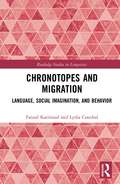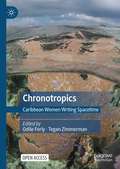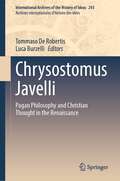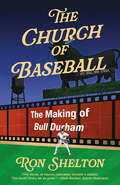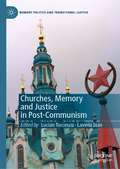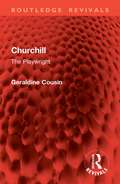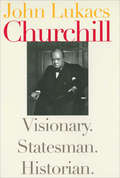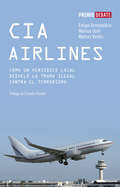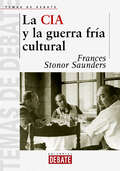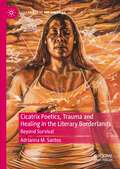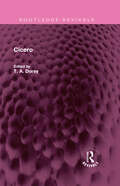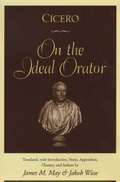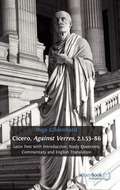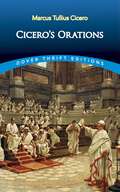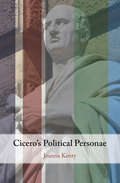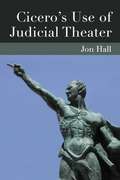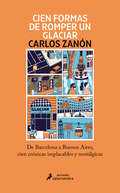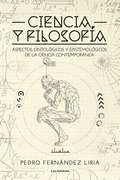- Table View
- List View
Chronotopes and Migration: Language, Social Imagination, and Behavior (Routledge Studies in Linguistics)
by Farzad Karimzad Lydia CatedralIn Chronotopes and Migration: Language, Social Imagination, and Behavior, Farzad Karimzad and Lydia Catedral investigate migrants’ polycentric identities, imaginations, ideologies, and orientations to home and host countries through the notion of chronotope. The book focuses on the authors’ ethnographically situated research with two migrant populations – Iranians and Uzbeks in the United States – to highlight the institutional constraints and individual subjectivities involved in transnational mobility. The authors provide a model for how the notion of cultural chronotope can be applied to the study of language and migration at multiple scale levels, and they showcase a coherent picture of the ways in which chronotopes organize various aspects of migrant life. This book is a critical contribution to the conversation surrounding the sociocultural-linguistic uses of the chronotope, demonstrating its applicability not only to theorizing migration but also to theorizing language and social life more broadly.
Chronotropics: Caribbean Women Writing Spacetime
by Odile Ferly Tegan ZimmermanThis book deconstructs androcentric approaches to spacetime inherited from western modernity through its theoretical frame of the chronotropics. It sheds light on the literary acts of archival disruption, radical remapping, and epistemic marronnage by twenty-first-century Caribbean women writers to restore a connection to spacetime, expanding it within and beyond the region. Arguing that the chronotropics points to a vocation for social justice and collective healing, this pan-Caribbean volume returns to autochthonous ontologies and epistemologies to propose a poetics and politics of the chronotropics that is anticolonial, gender inclusive, pluralistic, and non-anthropocentric. This is an open access book.
Chrysostomus Javelli: Pagan Philosophy and Christian Thought in the Renaissance (International Archives of the History of Ideas Archives internationales d'histoire des idées #243)
by Tommaso De Robertis Luca BurzelliThe volume provides the first book-length study of Chrysostomus Javelli’s philosophical works. An Italian university professor and a prominent figure in the intellectual landscape of sixteenth-century Europe, Javelli (ca. 1470-1540) was the author of insightful commentaries on both Plato and Aristotle as well as of original works in which he laid the foundations of a new Christian philosophy. In this volume, a group of leading scholars from around the world guide readers through the many facets of Javelli’s philosophical corpus, showing the long-term impact of his ideas on Western philosophical thought. The twelve essays of this volume shed light on an understudied yet central figure of Renaissance culture, revealing new connections and unexplored influences. This book is a valuable tool for students and scholars of early modern philosophy, classical tradition, and Christian theology, contributing to the understanding of a neglected chapter of Western intellectual history.
Chuck's Bad Luck (Word Family Readers:)
by Liza CharlesworthLet's Learn Readers boost key literacy skills through engaging, easy-to-read stories. Jump-start phonics learning with these super-fun books! For use with Grades K-2.
The Church of Baseball: The Making of Bull Durham: Home Runs, Bad Calls, Crazy Fights, Big Swings, and a Hit
by Ron SheltonFrom the award-winning screenwriter and director of cult classic Bull Durham, the extremely entertaining behind-the-scenes story of the making of the film, and an insightful primer on the art and business of moviemaking. &“This book tells you how to make a movie—the whole nine innings of it—out of nothing but sheer will.&” —Tony Gilroy, writer/director of Michael Clayton and The Bourne Legacy&“The only church that truly feeds the soul, day in, day out, is the church of baseball.&” —Annie in Bull DurhamBull Durham, the breakthrough 1988 film about a minor league baseball team, is widely revered as the best sports movie of all time. But back in 1987, Ron Shelton was a first-time director and no one was willing to finance a movie about baseball—especially a story set in the minors. The jury was still out on Kevin Costner&’s leading-man potential, while Susan Sarandon was already a has-been. There were doubts. But something miraculous happened, and The Church of Baseball attempts to capture why. From organizing a baseball camp for the actors and rewriting key scenes while on set, to dealing with a short production schedule and overcoming the challenge of filming the sport, Shelton brings to life the making of this beloved American movie. Shelton explains the rarely revealed ins and outs of moviemaking, from a film&’s inception and financing, screenwriting, casting, the nuts and bolts of directing, the postproduction process, and even through its release. But this is also a book about baseball and its singular romance in the world of sports. Shelton spent six years in the minor leagues before making this film, and his experiences resonate throughout this book. Full of wry humor and insight, The Church of Baseball tells the remarkable story behind an iconic film.
Churches, Memory and Justice in Post-Communism (Memory Politics and Transitional Justice)
by Lucian Turcescu Lavinia StanThis book is the first to systematically examine the connection between religion and transitional justice in post-communism. There are four main goals motivating this book: 1) to explain how civil society (groups such as religious denominations) contribute to transitional justice efforts to address and redress past dictatorial repression; 2) to ascertain the impact of state-led reckoning programs on religious communities and their members; 3) to renew the focus on the factors that determine the adoption (or rejection) of efforts to reckon with past human rights abuses in post-communism; and 4) to examine the limitations of enacting specific transitional justice methods, programs and practices in post-communist Central and Eastern Europe and the Former Soviet Union countries, whose democratization has differed in terms of its nature and pace. Various churches and their relationship with the communist states are covered in the following countries: Germany, Poland, the Czech Republic, Slovakia, Romania, Albania, Bulgaria, Estonia, Latvia, Lithuania, Russia and Belarus.
Churchill: The Playwright (Routledge Revivals)
by Geraldine CousinFirst Published in 1989, Churchill: The Playwright is an illuminating and comprehensive guide to Caryl Churchill’s stage, television, and radio plays. Alongside Top Girls, Fen and Serious Money, plays that have established Churchill as one of the most notable writers of the decade, Geraldine Cousin examines some of Churchill's major themes-the nature of time and the revolutionary possibilities for change- in earlier plays such as Light Shining in Buckinghamshire, Traps and Cloud Nine.Through detailed analysis Geraldine Cousin shows Churchill's development towards the challenging, innovative style and combination of pungent satire and compassion, that have made her such a successful chronicler and critic of our time. This is a must read for scholars and researchers of theatre studies.
Churchill: Visionary. Statesman. Historian.
by John Lukacs&“Lukacs convincingly portrays a leader of an empire in irreversible decline and a towering, if flawed, hero of our time.&”—Publishers Weekly In previous works, John Lukacs told the story of Winston Churchill&’s titanic struggle with Adolf Hitler in the early days of World War II. Now, he turns his attention to the man himself, the workings of his historical imagination, and his successes and failures as a visionary statesman. Chapter by chapter, Lukacs assesses Churchill&’s vital relationships with Stalin, Roosevelt, and Eisenhower; his complex, farsighted political vision concerning the coming of WWII and the Cold War; his abilities as a historian looking backward into the origins of the conflicts of which he was so much a part; and the often contradictory ways in which he has been perceived by critics and admirers alike. In addition, Lukacs describes his three days spent in London attending Churchill&’s funeral in 1965. &“Superb…[a] tour de force.&”—Foreign Affairs &“Lukacs&’ ability to meld the scholarly with the popular is much in evidence here.&”—Booklist
Chuukese Alphabet (Island Alphabet Books)
by Lori PhillipsThis book is part of the Island Alphabet Books series, which features languages and children's artwork form the U.S.-affiliated Pacific. Each book contains the complete alphabet for the language, four or five examples for each letter, and a word list with English translations.
CIA Airlines: Cómo un periódico de provincias desveló la trama ilegal contra el terrorismo
by Felipe Armendáriz Marisa Goñi Matías VallésPREMIO DEBATE El 6 de septiembre de 2006 el presidente Bush admitía públicamente la existencia de una red de prisiones secretas organizadas por la CIA. Así culminaba en parte una odisea periodística que comenzó casi un año y medio antes, el 12 de marzo de 2005, cuando Diario de Mallorca titulaba a toda página «La CIA utiliza Son Sant Joan como base de su avión cárcel». Desde entonces las noticias sobre los vuelos de la CIA a través de territorio europeo, en los que presuntamente se trasladaron ilegalmente sospechosos de terrorismo islámico, no han abandonado las primeras páginas de los periódicos. Y detrás de las querellas ante la Audiencia Nacional, los informes del Parlamento Europeo y las portadas del New York Times, está el trabajo de tres periodistas de Diario de Mallorca, que desde un medio regional han llevado a cabo una sobresaliente investigación, merecedora del primer premio Debate de libro reportaje, que ha destapado las oscuras maniobras de los servicios de inteligencia estadounidenses en la «Guerra contra el Terror». En este fascinante libro, el equipo de Diario de Mallorca que sacó a la luz el asunto cuenta la historia de los aviones prisión de la CIA en España, con especial énfasis en el papel de Mallorca y con una mirada a las repercusiones mediáticas mundiales y a la aparición en la era de Internet de un nuevo periodismo no sólo en la difusión, sino sobre todo en la elaboración de las noticias.
La CIA y la guerra fría cultural
by Frances Stonor SaundersUna historia apasionante de un sistema de mecenazgo clandestino que no tiene precedentes en la historia contemporánea. Durante la guerra fría los escritores y los artistas se enfrentaron a un gran reto. En la esfera soviética, se esperaba que produjeran obras que exaltaran la militancia, la lucha y un optimismo sin límites. En Occidente, la libertad de expresión era la virtud más preciada de las democracias liberales. Pero esa libertad tenía un precio. Este libro documenta el extraordinario vigor de una campaña secreta en la que algunos de los defensores más ardientes de la libertad de pensamiento en Occidente (entre otros, George Orwell, Bertrand Russell, Jean-Paul Sartre y Arthur Schlesinger, Jr.) fueron, lo supieran o no, instrumentos del servicio secreto estadounidense. La crítica ha dicho...«Una obra fundamental de investigación»Edward W. Said «Saunders es espléndida al contar las ironías éticas y políticas de los proyectos culturales de la CIA.»San Francisco Chronicle «Una historia de intriga y traición, con escenas tan emocionantes como las de cualquier novela de Le Carré.»The Chronicle of Higher Education «Escrita con gran sentido del humor y comprensión de las circunstancias históricas.»Los Angeles Times Book Review «La mejor crónica de las actividades de la CIA entre 1947 y 1967.»The New York Times «Una contribución esencial para la comprensión de la posguerra.»The Wall Street Journal
Cicatrix Poetics, Trauma and Healing in the Literary Borderlands: Beyond Survival (Literatures of the Americas)
by Adrianna M. SantosThis book explores how Chicana literature often represents gender violence while simultaneously presenting strategies of survival in response. Adrianna M. Santos aims to contribute to a broader conversation concerning the intersections between Chicana literature and decolonial trauma theory, one which questions the colonial matrix of power and the universality of Western knowledge. Santos argues that Chicana survival narratives arise out of colonial wounds and form scars that both mark and protect the violated body. Cicatrix Poetics, Trauma and Healing in the Literary Borderlands proposes a “cicatrix poetics” that makes bold gestures toward healing and narrative/storytelling as survival. The book contends that the cicatrix fashioned through artistic expression is a necessary component for Chicana communities—not just to survive, but to thrive. The books presents several case studies that examine transformative narrativity and by theorizing the texts as survival narratives, social protest works that bring attention to violence and erasure, the chapters explore how literature can be an effective catalyst for both social change and personal transformation, an orientation towards freedom, liberation through love.
Cicero (Routledge Revivals)
by T. A. DoreyFirst published in 1965, Cicero contains a number of assessments of Cicero’s life and works, made by a group of scholars that includes some of the acknowledged experts in their particular field. Cicero is a man on whom most judgments have been harsh. His political ideals, though sincerely held, were bypassed by the march of events; his public life was a series of frustrations; his personality was egotistical. However, as a speaker and a thinker, as a master of the use of language, and as a man of cultured interests and human disposition he deserves sympathetic study. The chapters in this volume deal with his political career, his character, his oratory, philosophy and poems, and his influence on subsequent literature and scholarship. This book will be of interest to students of literature, history and philosophy.
Cicero: Catilinarians
by Andrew R. DyckAs consul in 63 BC Cicero faced a conspiracy to overthrow the Roman state launched by the frustrated consular candidate Lucius Sergius Catilina. Cicero's handling of this crisis would shape foreverafter the way he defined himself and his statesmanship. The four speeches he delivered during the crisis show him at the height of his oratorical powers and political influence. Divided between deliberative speeches given in the senate (1 and 4) and informational speeches delivered before the general public (2 and 3), the Catilinarians illustrate Cicero's adroit handling of several distinct types of rhetoric. Beginning in antiquity, this corpus served as a basic text for generations of students but fell into neglect during the past half-century. This edition, which is aimed primarily at advanced undergraduates and graduate students, takes account of recently discovered papyrus evidence, recent studies of Cicero's language, style and rhetorical techniques, and the relevant historical background.
Cicero
by Andrew R. DyckAs consul in 63 BC Cicero faced a conspiracy to overthrow the Roman state launched by the frustrated consular candidate Lucius Sergius Catilina. Cicero's handling of this crisis would shape foreverafter the way he defined himself and his statesmanship. The four speeches he delivered during the crisis show him at the height of his oratorical powers and political influence. Divided between deliberative speeches given in the senate (1 and 4) and informational speeches delivered before the general public (2 and 3), the Catilinarians illustrate Cicero's adroit handling of several distinct types of rhetoric. Beginning in antiquity, this corpus served as a basic text for generations of students but fell into neglect during the past half-century. This edition, which is aimed primarily at advanced undergraduates and graduate students, takes account of recently discovered papyrus evidence, recent studies of Cicero's language, style and rhetorical techniques, and the relevant historical background.
Cicero
by David MankinCicero's De Oratore is one of the masterpieces of Latin prose. A literary dialogue in the Greek tradition, it was written in 55 BCE in the midst of political turmoil at Rome, but reports a discussion 'concerning the (ideal) orator' that supposedly took place in 90 BCE, just before an earlier crisis. Cicero features eminent orators and statesmen of the past as participants in this discussion, presenting competing views on many topics. This edition of Book III is the first since 1893 to provide a Latin text and full introduction and commentary in English. It is intended to help advanced students and others interested in Roman literature to comprehend the grammar and appreciate the stylistic nuances of Cicero's Latin, to trace the historical, literary, and theoretical background of the topics addressed, and to interpret Book III in relation to the rest of De Oratore and to Cicero's other works.
Cicero: On the Ideal Orator
by James M. May Jakob WisseCicero, the Roman orator and prose writer, gives his mature views on rhetoric, oratory and philosophy. Cast in the lively literary form of a dialogue, the work presents a daring view of the orator as the master of all language communication.
Cicero, Against Verres, 2.1.53–86: Latin Text With Introduction, Study Questions, Commentary And English Translations
by Ingo GildenhardLooting, despoiling temples, attempted rape and judicial murder: these are just some of the themes of this classic piece of writing by one of the world’s greatest orators. This particular passage is from the second book of Cicero’s Speeches against Verres, who was a former Roman magistrate on trial for serious misconduct. Cicero presents the lurid details of Verres’ alleged crimes in exquisite and sophisticated prose. <p><p> This volume provides a portion of the original text of Cicero’s speech in Latin, a detailed commentary, study aids, and a translation. As a literary artefact, the speech gives us insight into how the supreme master of Latin eloquence developed what we would now call rhetorical "spin". As an historical document, it provides a window into the dark underbelly of Rome’s imperial expansion and exploitation of the Near East. <p> Ingo Gildenhard’s illuminating commentary on this A-Level set text will be of particular interest to students of Latin at both high school and undergraduate level. It will also be a valuable resource to Latin teachers and to anyone interested in Cicero, language and rhetoric, and the legal culture of Ancient Rome.
Cicero's Orations: In Catilinam I-iv, Pro Caelio, Pro Milone, Pro Archia (Dover Thrift Editions)
by Marcus Tullius Cicero Charles Duke YongeThe greatest orator of the late Roman Republic, Marcus Tullius Cicero (106–43 B.C.), influenced the course of European letters for centuries after his death. Through his writings, Renaissance and Enlightenment scholars encountered the riches of Classical rhetoric and philosophy. The elegance of his style, his skill and erudition, his worldly wisdom, and his profound humanity made Cicero a model for latter-day thinkers and keep his works ever relevant. This collection presents examples of rhetoric from throughout the ancient Roman's illustrious career. Selections include a series of famous speeches delivered during Cicero's term as consul which thwarted the Catiline conspiracy to overthrow the Republic — but led to his own prosecution and exile. The compilation concludes with the bold orations delivered in defiance of Marc Anthony, which sealed Cicero's doom.
Cicero's Political Personae
by Joanna KentyCicero's speeches provide a fascinating window into the political battles and crises of his time. In this book, Joanna Kenty examines Cicero's persuasive strategies and the subtleties of his Latin prose, and shows how he used eight political personae – the attacker, the grateful friend, the martyr, the senator, the partisan ideologue, and others – to maximize his political leverage in the latter half of his career. These personae were what made his arguments convincing, and drew audiences into Cicero's perspective. Non-specialist and expert readers alike will gain new insight into Cicero's corpus and career as a whole, as well as a better appreciation of the context, details, and nuances of individual passages.
Cicero's Use Of Judicial Theater
by Jonathan HallIn Cicero's Use of Judicial Theater, Jon Hall examines Cicero's use of showmanship in the Roman courts, looking in particular at the nonverbal devices that he employs during his speeches as he attempts to manipulate opinion. Cicero's speeches in the law-courts often incorporate theatrical devices including the use of family relatives as props during emotional appeals, exploitation of tears and supplication, and the wearing of specially dirtied attire by defendants during a trial, all of which contrast strikingly with the practices of the modem advocate. Hall investigates how Cicero successfully deployed these techniques and why they played such a prominent part in the Roman courts. These "judicial theatrics" are rarely discussed by the ancient rhetorical handbooks, and Cicero's Use of Judicial Theater argues that their successful use by Roman orators derives largely from the inherent theatricality of aristocratic life in ancient Rome--most of the devices deployed in the courts appear elsewhere in the social and political activities of the elite. While Cicero's Use of Judicial Theater will be of interest primarily to professional scholars and students studying the speeches of Cicero, its wider analyses, both of Roman cultural customs and the idiosyncratic practices of the courts, will prove relevant also to social historians, as well as historians of legal procedure.
El Cielo Protector
by Paul BowlesEn 1947 una pareja que atraviesa una profunda crisis vital emprende un viaje a África con el fin de buscar solución a sus problemas. Él es un músico que desea encontrar inspiración en este viaje por el desierto; ella anhela que la pasión vuelva a renacer en su matrimonio. A partir de aquí las cosas se complican mucho más de lo que los dos esperan. El cielo protector fue llevada al cine por Bernardo Bertolucci en 1990, con Debra Winger y John Malkovich como sus principales intérpretes. Paul Bowles, como siempre en su obra, consigue crear en El cielo protector un clima de magia y embriaguez que envuelve un vigoroso análisis de las relaciones de dominación y dependencia entre los seres humanos. Paul Bowles nació en Nueva York en 1911. Su vocación vaciló, al principio, entre la música y la literatura. A partir de 1941 se concentra en ésta, dando lugar a un verdadero encadenamiento de obras magistrales. Lleva casi toda la vida fuera de EE UU, sobre todo en Ceilán y Marruecos. Ahora vive en Tánger, lejos de la vanidad del éxito, pero cada vez más afincado en él.
Cien formas de romper un glaciar: De Barcelona a Buenos Aires, cien crónicas implacables y nostálgicas
by Carlos ZanónCien crónicas escogidas en las que Carlos Zanón nos desvela una realidad íntima e inaudita a través de su mirada cáustica y lírica Taxistas, bares, barrios y ciudades, mitos de la infancia, libros, películas, mucha música y familia: así de extenso es el «universo Zanón», y así de variadas son su flora y su insólita fauna, fruto de una reflexión implacable, pero también un tanto melancólica, sobre la realidad y las cosas del día a día que ve, piensa y recrea a su manera.Novelista y poeta, Carlos Zanón es también un narrador que escribe en un periódico. Tras varios años de colaboraciones ininterrumpidas en prensa, nos ofrece en Cien formas de romper un glaciar la contraparte real del universo imaginario que palpita en todas sus novelas. Elogios sobre el autor:«Carlos Zanón ha desarrollado una forma de contar historias y crear personajes que lo distinguen entre muchos otros autores. El ritmo de su prosa cuidada late en cada oración, golpea, sacude.»Claudia Piñeiro «Que Carlos Zanón es una de las mejores cosas que le ha pasado a la literatura de estos lares en los últimos años, es algo que ya dejó de ser un secreto.»Carlos Prieto«Carlos Zanón es poeta. Me gusta decirlo […] para responder a quienes defienden una novela sin poesía, una narración documentada y ceñida a los hechos, periodística supongo... No sé bien qué defienden.»Lilian Neuman «El cronista despiadado de nuestros tiempos.»Rosa Mora
Ciencia y Filosofía: Aspectos ontológicos y epistemológicos de la ciencia contemporánea
by Pedro Fernández LiriaLa ciencia contemporánea revoluciona el pensamiento humano. Ciencia y Filosofía nos propone un viaje fascinante por las sorprendentes implicaciones filosóficas de la ciencia contemporánea. <P><P>La última gran revolución en las ciencias físicas ha situado al pensamiento humano ante el reto más grande que jamás se le ha presentado, y el autor del presente libro se esmera en proporcionar al lector las claves necesarias para comprender su alcance y para poder afrontarlo. <P><P>Ciencia y Filosofía es un concienzudo y documentado estudio capaz de cautivar tanto a filósofos y científicos, como a cualquiera que, sin una especial formación técnica y matemática, se halle interesado por los últimos progresos teóricos de la ciencia y por las conclusiones filosóficas de la revolución científica que provocaron las dos grandes teorías físicas del siglo XX: la teoría de la relatividad y la mecánica cuántica. <P><P>Además de exponer el carácter esencial de ambas teorías, el libro discute algunas de las interpretaciones que se han hecho de las mismas y repasa algunos de los debates y controversias que su aparición ha suscitado en los últimos cien años (tanto entre los propios científicos, como entre los filósofos). <P>Por lo demás, Ciencia y Filosofía es un libro que podría y nos atreveríamos a decir que debería interesar a cualquiera que sienta una pasión por la ciencia como la que el propio autor trata de contagiar desde la primera página.
